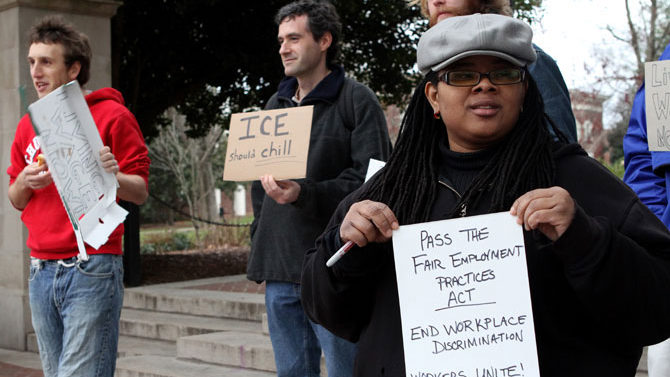“What’s outrageous? UGA wages!” was the call-and-response generating all those honks of support from evening commuters through downtown Feb. 13. Despite the blustery weather, a diverse group of community organizers at the Arch braved the cold to demand better wages for workers at the university, which employs more than 1,800 non-student workers at less than $10 an hour.
The “Workers Unite” rally kick-started the 2013 Living Wage campaign, which is ramping up again this spring with a particular focus on parking fees. Organizers are circulating a petition on Change.org calling on UGA administrators to waive the parking fees for low-wage employees, many of whom pay between $360 and $480 a year to park at work.
“Though UGA’s standard minimum hiring rate is $21,000 for full-time workers, many low-wage employees are considered part-time workers and don’t earn the minimum even though they have been working at the same job on campus for years,” said Elliott Caldwell, a UGA social work graduate student.
All employees who drive a car to work pay $20, $30, $40 or $60 a month, depending on the lot and type of space they choose. They also have the option of using the free Oconee Street park-and-ride lot or riding Athens Transit for free by swiping their UGA ID card, university spokesman Tom Jackson said. “To exempt some employees from such fees while charging others would raise the question of where to draw that line, when in fact our faculty, staff and students have a variety of options in parking and can tailor a program that best meets their individual needs,” Jackson said.
But it’s clear that parking costs are a burden for many low-wage workers, who received just a 1 percent pay raise last year and are often forced to work second jobs just to afford housing, let alone a parking space. The fair-market rent for a two-bedroom apartment is $768 a month, and to afford one, a family must earn $30,400 a year, the equivalent of two full-time minimum-wage jobs, according to an Athens-Clarke County study on housing impediments.
A single parent with a university job that pays $9,000 more annually than UGA’s $21,000 minimum salary cannot, according to those figures, find affordable housing in Athens, where more than 10 percent of families struggle with that problem. Perhaps that’s one reason why so many people working on campus also live outside of Clarke County. The $40 per month in parking fees is no small matter for workers facing such an economic bind.
The rally also demonstrated the mobilization of diverse coalitions brewing here in Athens. Leaders from UGA’s GLBTQ faculty and staff organization (GLOBES), Athens Immigrant Rights Coalition, Freedom University, Beyond Coal, Occupy Athens and the Economic Justice Coalition not only participated in the rally, but used it as an opportunity to strategize through a recently established umbrella organization: Athens Activists.
“We are focusing on economic justice, immigrant rights, LGBT equality and other important issues,” said Ricky Roberts, one of the founders, describing the network’s priorities and goal to raise awareness and bring about change.
One sign at the rally reading “ICE needs to chill,” prompted a discussion about parallels between the dangers of commuting faced by undocumented workers and the burden of parking fees on low-wage workers at the university.
Amid the collective effort to spotlight the role the university plays in keeping working people in poverty, another sign drew attention to the Fair Employment Practices Act, a bill in the state legislature that would “prohibit discrimination against lesbian, gay, bisexual and transgender workers in state employment.”
The organizers of the “Workers Unite” rally are also gearing up to play a supporting role in a big demonstration in Athens next month organized by undocumented youth from across the state. Beginning at noon on Wednesday, Mar. 6 at the Arch, undocumented students will continue leading protests against the Board of Regents’ ban that prevents them from attending UGA and four other post-secondary institutions in the state. Last fall, these undocumented activists joined up with UGA student organizers in the Beyond Coal campaign to bring their respective issues in tandem to a Board of Regents meeting at the Georgia Center. The Mar. 6 action will demonstrate more of such coalitional support.
Like what you just read? Support Flagpole by making a donation today. Every dollar you give helps fund our ongoing mission to provide Athens with quality, independent journalism.








